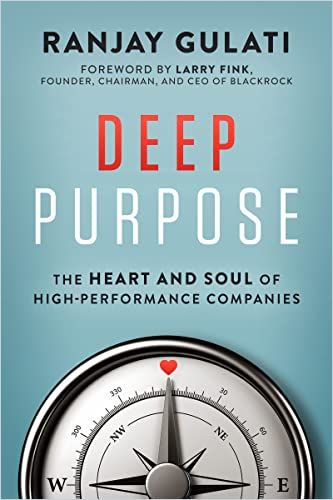Renowned business author Ranjay Gulati takes a deep dive into the power of purpose, its profitability and its pitfalls.

Purpose Is Power (and Profit)
Harvard professor Ranjay Gulati details how Apple, Bühler Holding AG, LEGO and PepsiCo enhanced their performance and profits by embracing and amplifying a sense of purpose throughout their organizations.
By contrast, Facebook exemplifies the “convenient purpose” of mouthing correct-sounding mottos while causing harm. Gulati, who is the former head of the Organizational Behavior Unit at Harvard Business School and chair of its Advanced Management Program, delves into the nature, utility and implementation of purpose. He explains how to harness its transformative power to inspire your organization, employees and stakeholders to the benefit of your sense of meaning, profit margin and public perception.
Reason for Being
Deep purpose leaders consider their organizations’ purpose every time they make a decision because they understand that purpose forges stakeholder unity.
Purpose is a unifying statement of the commercial and social problems a business intends to profitably solve for its stakeholders.Ranjay Gulati
For example, former CEO Indra Nooyi led PepsiCo through a seismic shift toward more healthful products. Nooyi’s slogan, “Performance with Purpose,” provided “a guiding mantra,” and made PepsiCo employees proud. Its stock outperformed the S&P 500 as it increased revenues by 80%.
“Convenient Purpose”
Many companies focus on purpose and make a profit while doing good. But sometimes a firm’s purpose statement disguises criminal misbehavior, as with, for example, Purdue Pharma, Enron and Theranos under founder Elizabeth Holmes.
Because some firms separate social responsibility from their business operations, they fail to offer profitable products that also advance social well-being or to change their operations to provide social benefit and sustainability.
Leaders pursue purpose superficially because for all their apparent enthusiasm, they don’t fully understand how devotion to a purpose enhances business performance.Ranjay Gulati
For example, in 2017, Facebook announced that its purpose was “to give people the power to build community and bring the world closer together.” However, many argue that Facebook exploits polarization by optimizing algorithms that fuel fear and anger. Gulati warns that when Facebook (or any company) puts forth an avowed purpose and then acts in contradiction of that purpose, the hypocrisy damages its prestige, undermines employee morale, impairs its ability to recruit the best talent, and alienates buyers and users.
Difficult Trade-Offs
Leaders must accept imperfection in order to do the best possible good for all stakeholders. For example, Gotham Greens grows food without pesticides inside urban greenhouses, using less water and land than conventional farming, and sometimes repurposing abandoned industrial sites.
Deep purpose leaders are the best kind of idealists, struggling endlessly to marry their dream-seeking with the realist’s hard edge.Ranjay Gulati
However, it packages its food in environmentally unfriendly plastic, a decision Gotham Greens’ leaders did not take lightly. The company examined the trade-offs between food spoilage and more environmentally beneficial packaging, and determined that food waste makes apparently “green” packaging less green than it appears.
Building his case example by example, Gulati seems to write for those who aren’t yet convinced of the positive aspects of merging profit and mission. He adroitly emphasizes – while seldom stating it outright – that companies that resist that purpose-plus-profit pairing will be left behind. This follows his theme that it is necessary for businesses to embrace both their moral and functional components.
Company Performance
Gulati suggests defining your organization’s purpose in order to focus your strategy, improve customer relations, inspire your employees and facilitate stakeholder engagement.
For instance, in 2010, Switzerland’s Bühler defined its purpose as creating “innovations for a better world.” Bühler’s machines process almost two-thirds of the global grain harvest. The company took on sustainability reporting for itself and its clients, aiming for – and achieving – reductions in waste and in energy and water consumption.
Purpose…enhanced strategy by helping the company channel innovation more powerfully.Ranjay Gulati
Purpose can turn transactions into relationships, provide a competitive advantage and even outweigh salary as a prospective employee’s priority.
Purpose in Tradition
In 2004, Jørgen Vig Knudstorp became CEO of LEGO as the company neared extinction. Knudstorp took action, slashing payroll and non-core ventures. By 2006, he had tripled profits while increasing sales. Researching LEGO’s history, Knudstorp discovered a slogan carved on a block of wood: “Only the best is good enough.” He recognized that as the company’s purpose.
Most companies and business leaders ignore the past, preferring to focus on the future.Ranjay Gulati
Not only should LEGO provide the best toys, Knudstorp understood, it should be the best place to work and the best supplier. He put those principles into action and profits increased by 400%.
“Moral Community”
Purpose helps people form a moral community, enhancing cooperation and trust.
Deep purpose leaders understand the sacredness that derives from authenticity, and they apply it specifically to their reason for being.Ranjay Gulati
Steve Jobs sought to short-circuit the habit of looking backward that he observed on Disney’s board, where leaders often asked, “What would Walt (Disney) have done?” Jobs established Apple University to teach employees the firm’s heritage, and he coached his successor, Tim Cook, never to ask “what Jobs would have done.”
Risks
Investors expect financial results and mission success, leaving leaders to face the “Do-Gooder’s Dilemma.” At Danone, for example, activist investors unseated chairman and CEO Emmanuel Faber, a deep-purpose leader who oversaw declines in Danone’s stock price and sales. Investors noted that Nestlé and Unilever prioritized their social mission and delivered better financial results than Danone.
The leaders who go deepest on purpose aren’t those who push the social logic at all costs.Ranjay Gulati
Neglecting financial performance will undermine your philanthropic purpose. Recognize that not every decision can deliver both commercial and social value.
Actualize Purpose
Determine your company’s purpose. Re-examine your purpose statement, and, if necessary, revise it. Stay cognizant of your organization’s traditional mission, legacy and need to prosper by fulfilling its purpose.
Review
When a significant business author like Gulati explores a subject, you experience the depth of his research, conviction and tactical insight on every page. He doesn’t write lightly, yet the pages fly by. Gulati strikes a rare balanced proportion between real-world examples and abstract guidance. While arguing for a moral business model, he underscores the necessity of profit; Gulati’s pragmatism offers real-world applicability and value.
Ranjay Gulati also wrote Reorganize for Resilience and Managing Network Resources. He co-wrote Management with Anthony J. Mayo and Nitin Nohria, and co-authored Kellogg on Technology and Innovation with Mohanbir Sawhney and Anthony Paoni.








